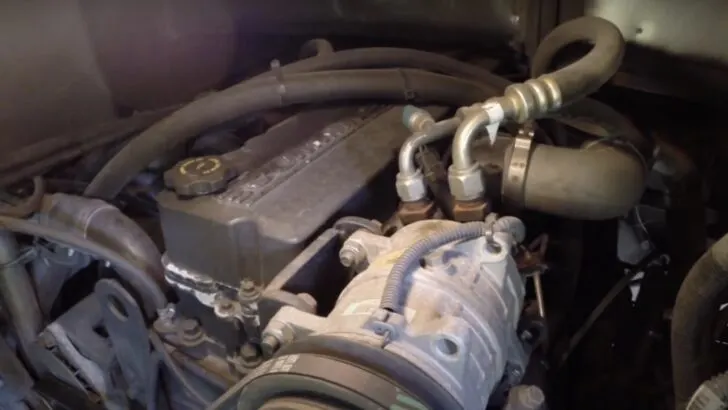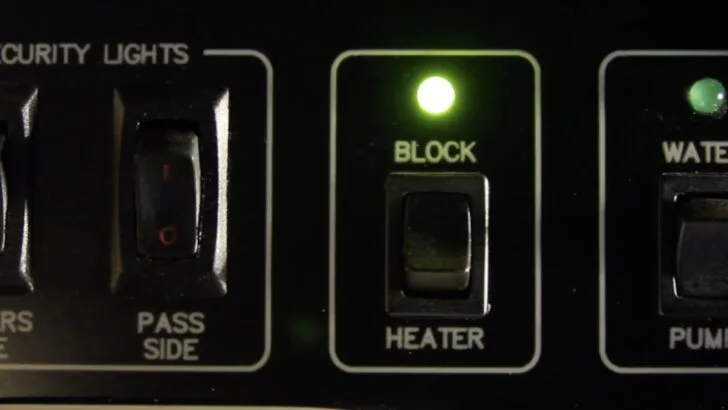If your RV has a diesel block heater and you never use it because you only travel where it’s mostly above freezing, you may want to consider the information in this post.
A diesel engine block heater is designed to heat the block in cold conditions in order to help the engine start. Many people never use theirs, even if their motorhome is equipped with one.
But even in higher temperatures, there are times when a block heater can make starting easier, and be good for your engine’s health, too.
In this post, we’ll explain why your engine, batteries, and starter motor can benefit from the extra care that your diesel engine block heater can provide, even if you’re not RVing in extremely cold conditions.
Let’s talk about when to use the block heater on a diesel!
- 1) What Is a Block Heater?
- 2) Do Diesel Engines Need Block Heaters?
- 3) Is It Bad to Cold Start a Diesel?
- 4) When to Use a Block Heater on a Diesel
- 5) How Long Should You Run a Diesel Block Heater?
- 6) Can You Leave a Block Heater Plugged In All Night?
- 7) What’s Your Experience With a Block Heater?
- 8) Free RVing Tips, Tricks, Reviews, Giveaways & More
What Is a Block Heater?
An engine block heater is designed to warm the engine and its components (it warms the motor oil in particular, and also heats the coolant). Various types of engine block heaters use different methods to provide heat.

An engine block heater is designed to warm the engine and its components. One of the most important functions of a block heater is the pre-heating of motor oil which can otherwise be quite thick in cold weather.
Block heaters pre-heat the engine coolant so that the cooling system is closer to the optimal operating temperature before starting. They also allow engine oil that has thickened from the cold to become less viscous and flow more freely.
The primary purpose of a block heater is to help the engine start in the cold. Not only does it make starting easier in cold temps, but it’s also good for your engine’s health.
Because colder temperatures cause engine fluids to become viscous or sticky, getting the engine warm before you turn the ignition key can reduce wear & tear on your engine.
Engine heaters pre-heat other engine components as well, providing optimal starting conditions.
There are other benefits, too. For example, using the block heater means reduced warm-up time, getting you on the road more quickly, and reducing fuel consumption by minimizing idling time.
And finally, using a block heater means that the cabin warms up faster. This is because your engine needs to reach operating temperature before it can start to provide heat to keep you warm.
Do Diesel Engines Need Block Heaters?
Yes, block heaters are especially important for diesel engines because in order for the fuel to fire, diesel engines require higher temperatures than gasoline-powered vehicles.
It’s important to note, though, that although diesel engines may have a harder time starting in cold weather, both diesel and gas-powered engines can benefit from having a block heater.
Is It Bad to Cold Start a Diesel?
Particularly in extremely low temperatures, it’s bad to cold start a diesel engine… and that’s IF it will start at all.
Some modern diesel engines may be equipped with glow plugs, which aid in cold weather starting. But those do nothing to pre-heat engine oil and components.
Over time, the more you cold start a diesel engine, the more wear and tear it causes because the thick oil isn’t in optimal condition to protect the moving parts of the engine.
So, the more times you cold-start your diesel rig, the more likely you are to adversely impact the life and health of your engine.
When to Use a Block Heater on a Diesel
Most often, people think of a diesel engine block heater as something they’d only use when in truly frigid weather, or when the engine is unable start without it. (Images of Alaska or Manitoba winter mornings come to mind!)
In fact, most diesel manufacturers call for using the engine block heater whenever you intend to start the rig at temperatures of 20°F or below.
But, after long periods of inactivity in even moderately cold conditions, an engine can take longer to start, causing extra wear and tear on internal components before oil can begin fully circulating. It’s also tougher on your battery and starter motor.
So, if you were to spend some time RVing longer term at an RV park in average temperatures lower than 50°F, for example, your diesel rig could really benefit from the engine’s block heater, turned on the evening before you plan to depart.
We’ve actually done this with our own diesel pusher motorhome many times. Anytime we’ve taken advantage of monthly rates at an RV park where temps have been cool, and we haven’t been running our engine, we’d turn on our block heater for the final night of our stay.

A diesel block heater isn’t only for use in sub-freezing temperatures. We use ours after long periods of inactivity, even in moderately cold temperatures. It helps our engine fire right up no matter how long it’s been sitting.
This only requires a small amount of power, and the value to the RV is well worth it. Not only does the rig start right up the following morning, but we have the reassurance that we’re giving our RV’s diesel engine the benefits provided by its block heater.
How Long Should You Run a Diesel Block Heater?
When you’ve been parked in a cool climate for a while, and you haven’t run your engine, you should turn on your diesel engine’s block heater for at least 2-3 hours prior to the first start-up.
If your rig has been parked in cold temps, however, you should turn on your block heater for at least 4 hours prior to the first start-up. Our SOP is to turn it on the evening before departure.
Can You Leave a Block Heater Plugged In All Night?
There’s no harm at all in leaving your diesel block heater plugged in overnight. As mentioned above, that’s our standard procedure.
It’s not necessary to leave it on all night, but the only risk you run is using a very small amount of additional electric power.
In theory, however, you could leave your diesel block heater plugged in for weeks… months, even. But beyond overnight, you’d just be wasting electricity and possibly shortening the lifespan of the heating element.
What’s Your Experience With a Block Heater?
If you’ve had a rig with a block heater, have you found it useful?
We’d be interested to know if, when, and how you’ve put your block heater to use.
Drop us a comment below.
Free RVing Tips, Tricks, Reviews, Giveaways & More
Subscribe to our daily newsletter! We’ve been full-time RVers for 20 years (!) and share everything we’ve learned about RVing in our daily blog posts. Join our online community to receive a wealth of great RVing knowledge delivered right to your inbox.
Whether this is your first time on the road or you’re a seasoned full-timer, you’ll love the wide range of RVing topics we cover. Don’t miss a single article or any of our famous RV gear Giveaways — Subscribe today!


Michael
Tuesday 28th of November 2023
Thanks for the great advise and insight. I reticently purchased my first diesel truck and am learning how to best take care of my investment.
Paul Roberson
Monday 1st of May 2023
Diesel Block heaters: Never run the engine while the heater is plugged in. The turbulence created by the water pump will cause the element to encounter air pockets, creating "hot spots" on the heating element, thereby causing premature failure.
Rich
Friday 28th of April 2023
To the Ventana owner: The Ventana does not have a switch, just the plug in the back compartment as you found. Plug it in when needed. I have the same thing in my 2017 Ventana.
Not So Free
Friday 28th of April 2023
In the owner's manual on my 2000 Ram diesel, it says not to use it above 32*F.
Ben
Friday 28th of April 2023
In my 2011 Ventana, there is a 120V outlet in one of the back compartment with a label that says "Block Heater". There is something plugged in it so I figured the block heated is always functioning. I temporarily used the plug for other things so I know it is working. What I never saw is a switch to turn the block heater on/off, should there be one somewhere? Is there a way to verify the b.h. is working?
TheRVgeeks
Saturday 29th of April 2023
Hi Ben... as Rich indicated, the Ventana has the outlet for a block heater, but no switch to control it. Some people have used the circuit breaker in the 120V AC breaker box to enable/disable it... but that circuit MAY also be wired as one of the power sources for the Intellitec EMS (if your Ventana has that), so disabling the breaker affects the function of the EMS. If that's true for you... unplugging that cord and just manually plugging it in when you need the block heater is your best bet.